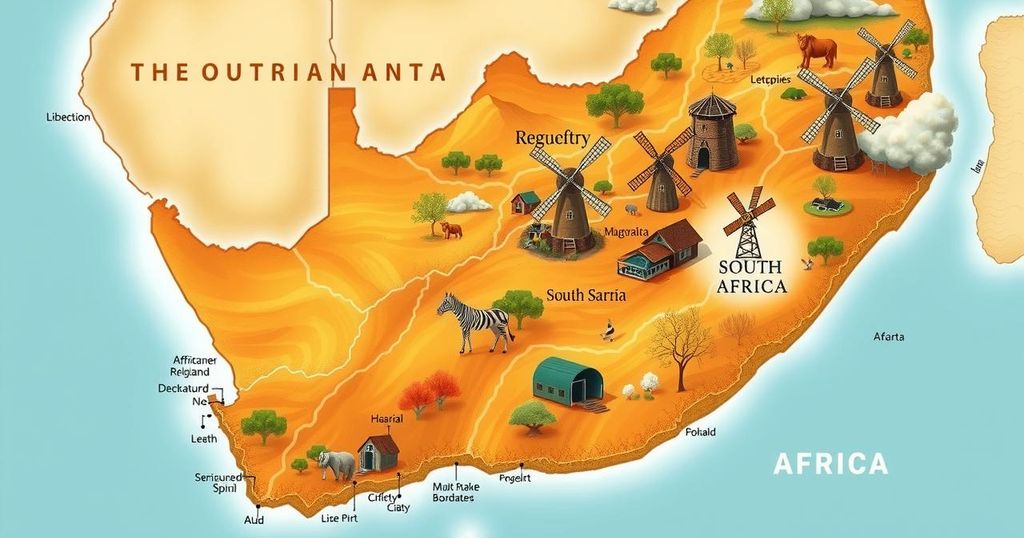Trump Backs Refugee Status for Afrikaners Amidst Controversy

President Trump announces the upcoming arrival of about 60 white South Africans, specifically Afrikaners, as refugees. This decision follows new land seizure laws in South Africa and amid broader halts on refugee admissions. The U.S. government cites racial discrimination as the motivation for this unique resettlement, while the South African authorities dispute these claims. The situation continues to stir debate on race relations and international policy.
In a significant move amidst halting broader refugee admissions, President Donald Trump has announced an exception for white South Africans, particularly those from the Afrikaner ethnic group. Expected to arrive on May 12, around 60 individuals classified as refugees have faced alleged racial discrimination in their home country. The decision marks a noteworthy pivot in U.S. refugee policy under a Trump administration already known for its strict immigration stance.
For years, South Africa was ruled under apartheid, a regime enforced by the country’s white minority, whose lineage traces back to Dutch settlers. The apartheid system, notorious for its enforced segregation, marginalized the majority Black population, denying them fundamental rights until its abolition in 1994. Today, Afrikaners, comprising a small segment of the population, assert they are becoming targets of new land seizure laws that could allow the government to confiscate property without compensation.
The roots of Trump’s support for the Afrikaners stretch back to his initial presidential term. However, it gained momentum following the enactment of the Expropriation Act, which has been criticized for its potential discriminatory implications. Trump has lambasted the South African authorities for what he called unjust land grabs, stating they are “confiscating land, and treating certain classes of people VERY BADLY.”
In February, Trump signed an executive order prioritizing the resettlement of Afrikaners, branding them as “escaping government-sponsored race-based discrimination.” This decision uniquely positions Afrikaners favorably within a refugee admission framework that has seen stricter regulations since Trump had taken office, effectively suspending the U.S. Refugee Admissions Program on his first day as President.
“What’s happening in South Africa fits the textbook definition of why the refugee program was created,” stated White House deputy chief of staff, Stephen Miller, underscoring that race-based persecution defines the situation. Tech entrepreneur Elon Musk, also from South Africa, has been vocal against the Expropriation Act which has spurred Trump to reconsider U.S. aid to South Africa.
In South Africa, where Afrikaners number around 3 million and trace roots to Dutch and Huguenot ancestry, they represent a significant portion of the nation’s roughly 4 million white citizens. Contrary to their advocates in the U.S., South African President Cyril Ramaphosa contests claims of discrimination, arguing that land policies aim to address historical disparities stemming from apartheid. For context, a 2024 study reveals that Black households in the country hold just 5% of the wealth of their white counterparts, illustrating the systemic inequalities still present today.
South Africa’s government has decried Trump’s assertions as unfounded, characterizing the narrative of discrimination as politically charged. They emphasize that the nation has struggled against the remnants of apartheid and aim to prevent the recurrence of that past. In a statement released on May 9, the Ministry of International Relations and Cooperation criticized the refugee claims as politically motivated.
As preparations continue for the arrival of the Afrikaners at Dulles International Airport on May 12, it remains to be seen how this will impact U.S.-South Africa relations moving forward. Despite a lack of confirmed numbers from the State Department regarding the specific refugee population, the embassy in Pretoria continues to conduct interviews for those hoping to make a new start in the U.S.
The unfolding situation regarding the arrival of white South Africans, specifically Afrikaners, highlights a significant policy exception in U.S. refugee admissions. Amidst claims of discrimination by the Afrikaners and South African government rebuttals about the Expropriation Act, this decision by the Trump administration adds complexity to the narrative of post-apartheid South Africa and raises questions about international relations. The implications of these refugee admissions could potentially reshape perceptions on race and discrimination both in the U.S. and in South Africa itself.
Original Source: www.usatoday.com




